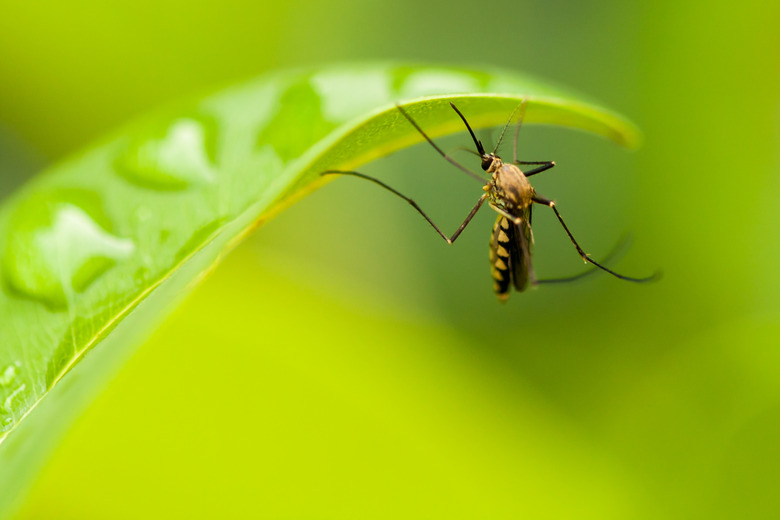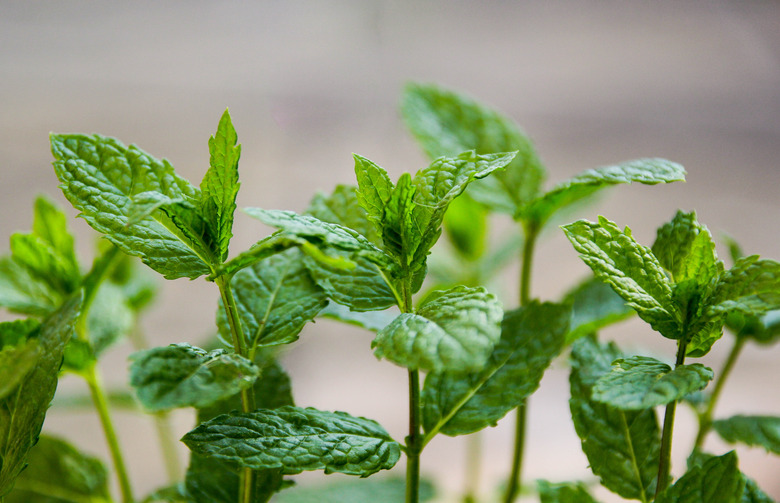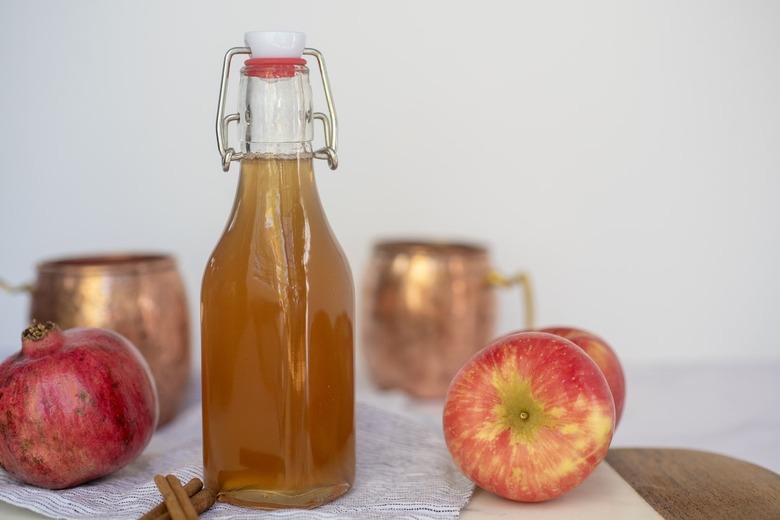Are There Actually Plants That Repel Mosquitoes? Here's What The Science Says
We may receive a commission on purchases made from links.
Plants that repel mosquitoes sound like an absolute dream. Who wouldn't be willing to change their landscaping if it meant they could avoid using bug spray or suffering irritating and possibly disease-spreading mosquito bites? But can you really keep these pests away by just planting a few selected herbs and shrubs? Though there is evidence that mosquitoes are put off by specific scents, the large listicles you often see online (i.e. "25 plants that repel mosquitoes") are not entirely based on science.
We spoke with a mosquito expert — Shannon Harlow-Ellis, an associate certified entomologist employed by Mosquito Joe — to separate fact from fiction regarding mosquito-repelling plants.
Can Plants Ward Off Mosquitoes?
Can Plants Ward Off Mosquitoes?
Yes, to some extent, plants can ward off mosquitoes, and some plants do indeed have odors that repel mosquitoes. However, it's important to note that while planting these in your garden may reduce the number of mosquitoes in the area, they won't stop you from getting bitten. You'll actually need to make a repellant with their essential oils to avoid bites (and even then, the results can be mixed).
"There are plants that some researchers claim to have mosquito repellency," Harlow-Ellis tells Hunker. "These would include lemongrass, citronella, rosemary, lavender, and catnip."
In one study published on PLOS One, for example, researchers reduced the number of mosquitoes entering homes in Tanzania by 50 percent simply by surrounding the structures with lantana plants.
Plant components had long been the go-to solution for repelling mosquitoes until synthetic treatments were developed in the last 100 years. People have hung bruised plants in and around their homes for thousands of years to keep away these blood-thirsty pests. Ancient Greek, Roman, and Indian scholars wrote about burning plants to drive away mosquitoes and applying oils made with plant products. And though it seems like DEET is ubiquitous, plant-based repellents are still the primary method of mosquito prevention throughout much of the developing world.
Why Do Mosquitoes Avoid Certain Plants?
Why Do Mosquitoes Avoid Certain Plants?
"Mosquitoes use multiple sensory cues to find a meal. First, they pick up a scent, like body odor, elevated carbon dioxide levels, and even a particular blood type," says Harlow-Ellis. "These plants [mosquitoes avoid] have strong fragrances that may repel some insects by masking the scents they would hone in on to find a blood meal."
In other words, with these plants distracting them, mosquitoes don't even notice us and keep looking for food sources.
Which Plants Repel Mosquitoes?
Which Plants Repel Mosquitoes?
So, which plants actually repel mosquitoes effectively? Of course, the answer to this question is that it's complicated. The reason why is that different plants repel different species of mosquitoes. In a study published in the journal Insects, researchers tested 10 essential oils (which, of course, are derived from plants) to see their effectiveness at repelling against three mosquito species.
Even though the results weren't quite the panacea the researchers likely hoped it would be, it's clear that mosquitoes are turned off by some plants. It's good to keep in mind that to prevent bites you would need a heavily concentrated amount of these plants (i.e. an essential oil). Furthermore, you'd also need to make sure your backyard is well set up for these specific plants. (Cinnamon trees, for example, need to grow in a tropical climate, which most of the U.S. is unfortunately not.)
Keeping all of this in mind, here are the best plants to try to repel a few of the most dangerous and most common mosquito species in the U.S.:
Most Effective Mosquito-Repelling Plants by Species
|
Mosquito Species |
Most Effective Repellent Plants |
|
Aedes aegypti |
Cinnamon, clove |
|
Anopheles dirus |
Peppermint, sage, clove |
|
Culex quinquefasciatus |
Lemongrass, basil, clove |
Curious about some of the least effective repellent plants? The study found that cedarwood, rosemary, and vetiver didn't do the trick against mosquitoes. You'll also find that commonly used citronella isn't on our list of most effective repellent plants. It's long been considered a myth that citronella is effective on repelling mosquitoes, but the shelves are still filled with these products, so take note of this the next time you go to the garden section hoping for some relief.
Warning
If you want to use plants as part of your mosquito prevention plan, you'll first need to find the specific type of mosquitoes in your area and then identify the plants that repel those species most effectively. However, be warned that many areas throughout the U.S. are infested by dozens of different mosquito species (Miami-Dade County is home to 48!), so targeting the species in your region may be difficult.
Can Your Garden Protect You From Mosquito Bites?
Can Your Garden Protect You From Mosquito Bites?
Unfortunately, while plants may be able to reduce mosquito populations, growing them in your garden isn't enough to stop you from being bitten. Even if a barrier of lantana plants can reduce the number of mosquitoes entering a home, 50 percent of the bugs still make it inside, where they can bite residents and spread disease. Again, plants alone won't prevent you from getting mosquito bites. For a natural bug repellent, you'll need to use essential oils derived from mosquito-repellent plants to avoid bites (and even then, the results vary).
If you're thinking about placing mosquito-repelling plants in your garden to keep the pests out of your yard, your results will be even less impressive because, as Harlow-Ellis says, "The required concentration is degraded in the outdoor environment." In other words, while the right plants may be able to keep a few mosquitoes out of your garden, that typically won't be enough to stop you from getting bitten.
If you want to incorporate plants into your mosquito-prevention plan, you can:
- Try hanging bruised or fresh plants around your doors and windows.
- Injuring the plant leaves actually releases more of the aromas that keep away mosquitoes, but this may also cause the plants to lose their fragrance more quickly, rendering them less effective over time.
Whatever you do, avoid using dried plants, as they are far less aromatic than fresh plants, making them less effective.
Does Burning Plants Repel Mosquitoes?
Does Burning Plants Repel Mosquitoes?
In developing nations, burning plant leaves is the most common method of mosquito prevention. A study published in the Malaria Journal found that burning dried leaves is more effective at warding off mosquitoes than hanging fresh or dried leaves. The study found that burning the leaves of the lemon eucalyptus plant repelled between 52 and 76 percent of mosquitoes, while burning African basil repelled between 58 and 68 percent of the pests.
Another study published in Heliyon found that burning a combination of ground leaves from the neem tree, the river red gum tree, and basil reduced the number of Culex quinquefasciatus in small huts by 92 percent.
Plant materials that may help ward off mosquitoes when burned include:
- Lemon eucalyptus plant
- A combination of leaves from neem trees, river red gum trees, and basil
- Lantana leaves
- Lemon-scented gum tree leaves
- Curry tree
leaves - Orange peels
- Baobab tree leaves
Like the experiment with lantana, these studies focused on indoor areas to help those in developing areas, but these measures will be less effective for warding off mosquitoes outdoors. However, grinding up dried leaves of mosquito-repellent plants and burning them on your grill or fire pit could make relaxing on your patio a little more comfortable. For best results, use charcoal to burn your mosquito-repelling plants, as researchers found that charcoal alone can reduce mosquito populations by 20 percent.
Warning
Before you grab your coffee grinder to start preparing dried leaves for your next bonfire or barbecue, consider that burning plant materials presents health risks. "This process involves some significant risks, especially with allergic reactions and smoke inhalation," warns Harlow-Ellis.
Exposure to smoke and particulate matter can cause nose irritation, coughing, breathing difficulties, and headaches, even in healthy individuals. Avoid this pest control method if you have respiratory conditions, allergies, infections, or heart disease.
DIY Plant-Based Mosquito Repellent
DIY Plant-Based Mosquito Repellent
Technically, you may be able to ward off mosquitoes by rubbing repellent plants on your skin, releasing their essential oils directly on your body. Unfortunately, the fragrances released from bruised plants are notably volatile, meaning they evaporate quickly. So, unless you want to continuously rub plants onto your skin, you'll probably want to make a liquid repellent.
Even then, Harlow-Ellis says "Homemade mosquito repellents can be effective, but they do need to be reapplied more often, as the fragrance tends to dissipate over time." In fact, a study published in Phytotherapy Research found that no essential oil could repel the mosquito species Aedes aegypti for more than two hours.
To get the most out of plant odors, you'll need to either buy or make your own essential oils because these concentrated fragrances more effectively ward off mosquitoes than fresh plants do. While there are many recipes for essential-oil-based mosquito repellents, Harlow-Ellis recommends the following combination:
- 2 ounces of apple cider vinegar
- 2 ounces of distilled water in a small spray bottle
- 40 drops of peppermint essential oil
Shake well before applying.
Are Homemade Mosquito Repellents Safe?
Are Homemade Mosquito Repellents Safe?
Don't automatically assume that something is safer just because it is natural. DEET has been around since 1946 and is used by over 200 million people worldwide every year with minimal reported side effects. On the other hand: "Essential oils in general can be dangerous when not diluted," says Harlow-Ellis, noting that many essential oils can be toxic if ingested.
As a matter of fact, citronella insect repellents are no longer sold in Canada or the EU because they contain methyl eugenol, a possible carcinogen. Clove oil may be a notably effective mosquito repellent, but it too contains methyl eugenol and has been known to cause skin irritation and headaches.
When to Avoid Homemade Mosquito Repellents
When to Avoid Homemade Mosquito Repellents
Even if you loathe the idea of purchasing commercial mosquito repellents, there are some situations where you should only trust products formally tested and approved by the Environmental Protection Agency. Whereas most home remedies only reduce your likelihood of being bitten, products containing DEET, picaridin, or oil of lemon eucalyptus are very effective at preventing bug bites during the time frame stated on the product label.
Even if you don't mind scratching the occasional bug bite, don't forget that mosquitoes are considered the most dangerous animal on Earth. They carry nasty diseases, including West Nile, malaria, zika, eastern equine encephalitis, and dengue fever, killing over 725,000 people annually.
Some people are at greater risk for mosquito-borne illness than others. Do not rely solely on homemade mosquito repellents if you or your family members are:
- In an area infested with mosquitoes known to be
carrying disease - Pregnant or likely to become pregnant
- Over 50 years old
- Under 15 years old (especially infants)
- Inflicted with a known health condition, such as a heart
condition or diabetes - Immunocompromised
If you feel uncomfortable with synthetic chemicals such as DEET or picaridin, consider using something made from oil of lemon eucalyptus, the only CDC-approved plant-based repellent. Commercial oil of lemon eucalyptus bug sprays are as effective as products with a 15 to 20 percent concentration of DEET.
Tip
Do not make your own repellent with lemon eucalyptus essential oil and assume it will work as well as commercial products containing oil of lemon eucalyptus because while the names are similar, these oils are different. In fact, oil of lemon eucalyptus is actually a byproduct of the hydro-distillation of the plant's essential oil.




